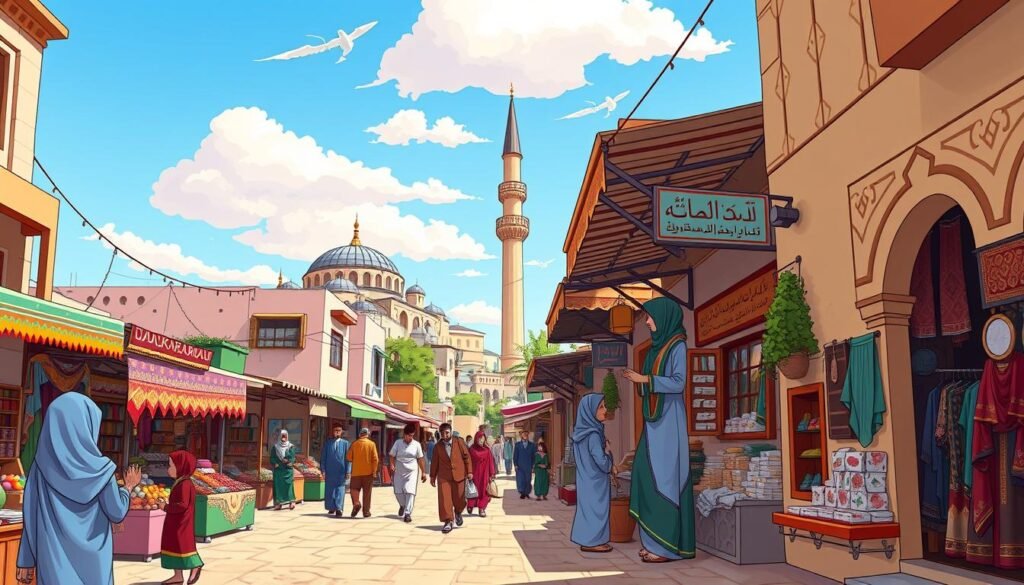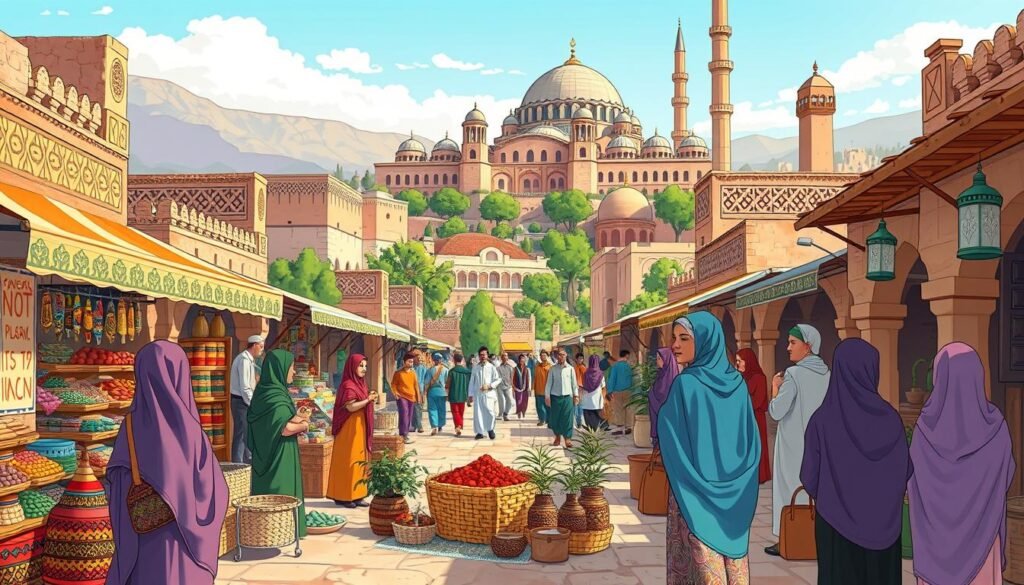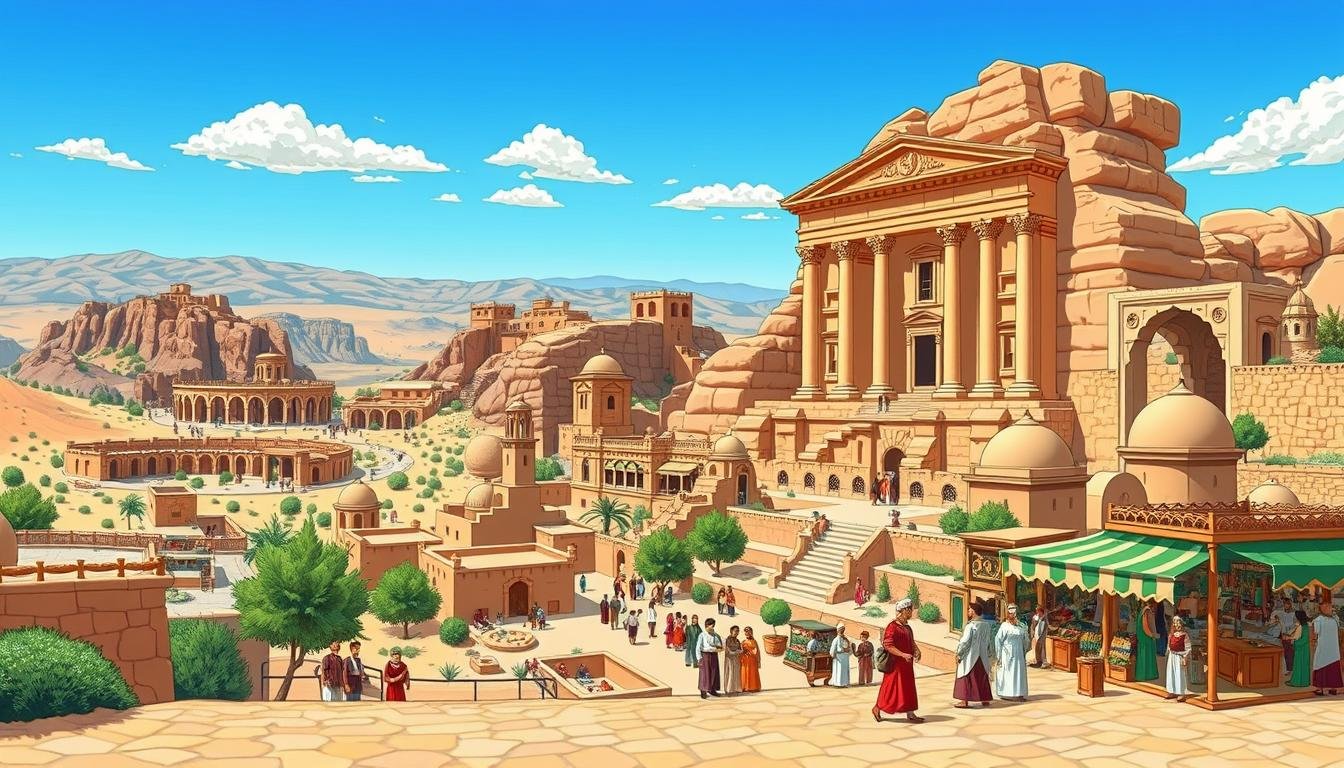Have you ever thought about how a country can be both diverse and mostly one faith? Jordan is a great example. It’s seen as a Muslim-majority country in the Middle East. About 96% of its people follow Sunni Islam.
This mix of religion and identity shapes Jordan’s society and laws. The country’s constitution makes Islam the official religion. This shows Islam’s big role in Jordan’s government and culture.
Looking into Jordan’s religious makeup helps us understand it better. While 96% are Sunni Muslims, there are also Christians and Druze. This mix makes Jordan’s culture rich and interesting.
It’s worth looking into how Islamic rules affect everyday life and how people interact. For more on Islam in Jordan, including traditions and practices, check out Muslim Culture Hub.
Overview of Jordan’s Religious Landscape
The Jordan religious landscape is mostly Sunni Muslims, making up about 95% of the people. This strong Islamic presence greatly influences the culture and society. Besides Sunni Islam, Jordan also has religious minorities like Christians, Druze, and Bahá’ís. They add to the country’s rich mix of beliefs.
Christians make up about 3% of the population, living in cities like Husn and Madaba. They belong to different groups like Greek Orthodox and Roman Catholic. Even though they are a minority, the Druze and Bahá’ís also play a big role in Jordan’s religious scene.
Jordan is known for its religious freedom, allowing different faiths to live together. But, Sharia law in personal matters can be complex. This makes the rights of religious minorities a big concern.
The mix of Sunni Muslims and religious minorities shows Jordan’s unique identity. It helps us understand how religion and government policies shape society. To learn more about Jordan’s history and culture, visit this link.
Is Jordan A Muslim Country?
Jordan is in the Middle East and is mostly Muslim. About 97.2% of people there are Muslim. Most of them follow Sunni Islam, which is very important in Jordanian life.
People in Jordan really stick to their Islamic values. This shows a strong bond among them.
Even though most people are Muslim, Jordan is also home to Christians. They make up about 2.1% of the population. Muslims and Christians live together peacefully, showing respect and understanding.

The royal family of Jordan, the Hashemites, are Sunni Muslims. This makes Islam very important in the country. Islam’s teachings guide laws and customs in Jordan.
Visitors can see how Islam shapes Jordan. From its buildings to festivals, Islam’s impact is clear. Jordan balances modern life with its Islamic traditions.
Religious Demographics of Jordan
Jordan’s religious makeup is mostly Muslim, shaping the country’s culture and society. About 97.1% of people are Sunni Muslims. This big Sunni Muslim group influences daily life and behavior in Jordan.
Many Muslims in Jordan practice Sufism. They seek a deeper, mystical connection with their faith. This journey is all about inner growth.
Sunni Islam as the Dominant Religion
Sunni Islam is the main religion in Jordan, with 96% of the population following it. This shows how deeply Islamic traditions affect Jordanian society. The Five Pillars of Islam guide daily life and community values.
These pillars help Jordanian Muslims feel united. They shape the country’s strong sense of togetherness.
Minority Religions: Christianity, Druze, and Others
While Sunni Islam is the biggest, other religions add to Jordan’s faith diversity. Christians make up 2-4% of the population, with the Greek Orthodox being the largest. Other Christian groups include Greek and Roman Catholics, Syrian Orthodox, Coptic Orthodox, and Protestants.
The Druze, between 20,000 and 32,000, live mainly in the northwest. Some Druze don’t see themselves as Muslims anymore. This shows the variety of beliefs in Jordan.
There are also Buddhists, Hindus, and Jews in Jordan. They face challenges in practicing their faith openly. Yet, they add to the country’s rich religious mix.
Historical Context of Islam in Jordan
The history of Islam in Jordan is rich and complex. It started in the 7th century when Islam spread beyond Arabia. This laid the groundwork for Jordan’s unique culture and society.
Development of Islamic Governance
The growth of Islamic governance in Jordan is key to the region’s history. The Hashemite monarchy has shaped Jordan’s identity, connecting it to Islamic traditions. Since 1921, the Hashemite family has united Muslims and Christians through their rule.
Today, Islamic laws affect Jordan’s daily life. For example, restaurants close during Ramadan. This shows how Islamic traditions shape everyday routines. With almost all people being Muslim, fasting and prayer are part of life.
The history of Islam in Jordan also shows different views on religion. The Muslim Brotherhood, started in 1945, has played a big role in politics. Its work with the monarchy ended in the late 1970s, affecting governance and society.
Jordan is a key place for Islamic history, with many important sites. These landmarks add to Jordan’s cultural wealth. They help us understand Islam’s history in Jordan. Islamic governance continues to shape Jordan’s society today.
Constitutional Framework for Religion
The Jordan constitution has a complex view on religion and government. It promises religious freedom but also makes Islam the state religion. This mix shows how Sharia law plays a big role in making laws in Jordan. The king must follow Islam, showing how important religion is in the country.
Even though the constitution seems to allow different religions, it’s not that simple. Changing from Islam is hard, which limits religious freedom in Jordan. This problem comes from mixing secular rules with religious ones. It makes it tough for people to explore their faith freely.
Practicing Islam: Cultural Integration and Traditions
In Jordan, Islamic culture is a big part of daily life. People follow prayers and eat only halal food. This shows how faith is part of their daily routines.
Many people fast during Ramadan. This month of fasting brings everyone together. It shows the importance of community and faith.
Different places in Jordan celebrate Ramadan in their own ways. Cities have big parties, while villages have quieter celebrations.
Sufism adds another layer to Jordan’s religious life. It mixes spirituality with local traditions. This shows how Islamic values can fit into Jordanian culture.
It’s important to keep Islamic values and local customs together. This mix shows how Islam can be flexible. It lets people keep their culture while following their faith.

Even though people see Islam differently, the main teachings stay the same. The ongoing talks about Islamic practices help us understand how traditions change. For more on religious freedom in Jordan, check out this report.
Societal Attitudes Toward Religious Diversity
Jordanian society is a mix of old traditions and new ways. This is especially true when it comes to different religions. *Muslims make up about 97.2%* of the people, setting a strong Islamic culture. In 2022, Christians were about 2.1% of the population, showing a small but active Christian group.
The relationship between Muslims and Christians is generally calm. The Christian community in Jordan is diverse, with many having a Muslim background. Smaller groups like the Druze and Bahá’í face more challenges, with around 14,000 and 1,000 members respectively.
Even though Jordan is mostly open to different religions, there are still issues. There are rules against changing religions from Islam and against trying to convert others. This shows the limits of what is accepted in Jordanian society.
So, Jordan balances its acceptance of different religions with a strong Islamic identity. Knowing this balance is key for anyone interested in Jordan’s complex society.
Government Policies on Religious Freedom
In Jordan, the rules on religious freedom are strict. It’s easy to convert to Islam, but leaving it is hard. This makes life tough for those who change their faith.
Family laws based on Sharia don’t always accept new faiths. This can hurt a person’s rights and family ties.
Legal Restrictions on Conversion
Thinking of leaving Islam? You might face big problems. You could get in trouble for trying to change someone’s faith. This could lead to jail or fines.
The Constitution makes it clear that Islam is important. It says the king must be a Muslim. This shows how hard it is to change faith in Jordan.
Understanding these laws helps us see the struggles of converts. It also shows the need for respect for all beliefs. This is key for better understanding between different faiths.
For more on how food laws affect interfaith meals, check out this article.
FAQ
What percentage of Jordan’s population identifies as Muslim?
Is Islam the official religion of Jordan?
Are there other religions practiced in Jordan?
How does Jordan’s government approach religious freedom?
What role does the Hashemite monarchy play in Jordan’s religion?
How does Islamic culture manifest in daily life in Jordan?
What challenges do religious minorities face in Jordan?
Can individuals convert to Islam in Jordan without complications?
What is the history of Islam in the context of Jordan?

Embracing Faith, One Insight at a Time!
The teachings of the Quran have always guided my path. With a deep passion for Islamic knowledge, I strive to blend the wisdom of tradition with the relevance of today, making the timeless messages of Islam accessible and meaningful for everyone.
Muslim Culture Hub is my platform to share historical insights and thought-provoking articles, exploring both well-known and lesser-discussed aspects of Islamic culture and beliefs. My mission is to create an inclusive online space where everyone can learn, strengthen their faith, and connect with the profound message of Islam.
Join the journey!
May peace be upon you.








